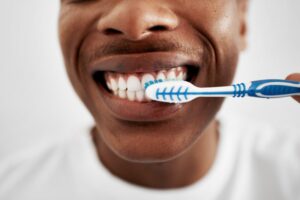
Like many people, you may think the harder you brush, the cleaner your teeth become. Unfortunately, using too much force while brushing and flossing can actually lead to consequences for your oral health. Plus, it doesn’t take a lot of power to effectively clear away plaque and food debris from the surface of your smile! Read on for four signs that you’re brushing your teeth too hard and how you can effectively clean your teeth without damaging your gums.
4 Signs You’re Brushing Too Hard
If you notice two or more of these four signs that you’re brushing too hard, you may want to schedule a checkup with your dentist to make sure your habits haven’t led to the development of other oral concerns, like gum disease or infections.
1. Your Gums are Receding
Gum recession can be a symptom of gum disease, but it can also be a sign that you’re using way too much force to brush your teeth. Over time, brushing too hard can cause your gum tissue to pull away from the surface of your teeth, making them appear longer than they actually are.
2. Your Teeth Feel Sensitive
Brushing too hard can not only reveal the sensitive root structure of your teeth, but it can also wear the protective outer layer of your teeth, called the enamel. When this occurs, it’s likely that your teeth will be hypersensitive to cold, making it uncomfortable to eat foods like ice cream or sip on cold drinks.
3. Your Gums Bleed Every Time You Brush
Similar to gum recession, bleeding whenever you brush or floss could be a sign of gum disease, but it can also be a sign of gum inflammation and irritation caused by brushing too hard. You’ll likely notice blood mixed into your toothpaste when you spit it into the sink if this is the case.
4. Your Toothbrush Becomes Frayed Quickly
If you just replaced your toothbrush a week or even a month ago and the bristles are already frayed, it’s a good sign that you’re brushing your teeth too hard. Toothbrush heads should last around three months before needing to be replaced. Additionally, brushing with a frayed toothbrush can also lead to gum damage.
How Much Force Do You Need to Apply When Brushing Your Teeth?
If you’ve learned that you’re brushing your teeth too hard, you’re likely wondering what it looks like to brush them just enough pressure to remove plaque without damaging your gums. The answer to this question really depends on the type of toothbrush you’re using.
If you have an electric toothbrush, you can apply little-to-no pressure while brushing, as the vibration and movement from the toothbrush head will create enough friction to remove food debris and plaque accumulation. If you’re using a manual toothbrush, be gentle, only rubbing the toothbrush against your teeth and along your gumline in a circular motion. You need virtually no force to effectively clean them, just make sure you’re reaching into all of the nooks and crannies towards the back of your mouth.
At your bi-annual checkup with your dentist, they can let you know whether you’re using too much force to brush your teeth and recommend a good electric toothbrush for you to prevent gum damage. Remember, there’s such thing as being too ambitious about removing plaque with your toothbrush!
About the Author
Dr. Arrechea has over 20 years of experience practicing dentistry and loves seeing her patients smile and feel confident in their oral health. She’s proud to offer removable full and partial dentures as well as relining services to help her patients get the most out of their replacement teeth. To learn whether your dentures need to be adjusted, visit Daily Smiles Dental Dallas’ website or call 214-624-6221 today to schedule an examination.
